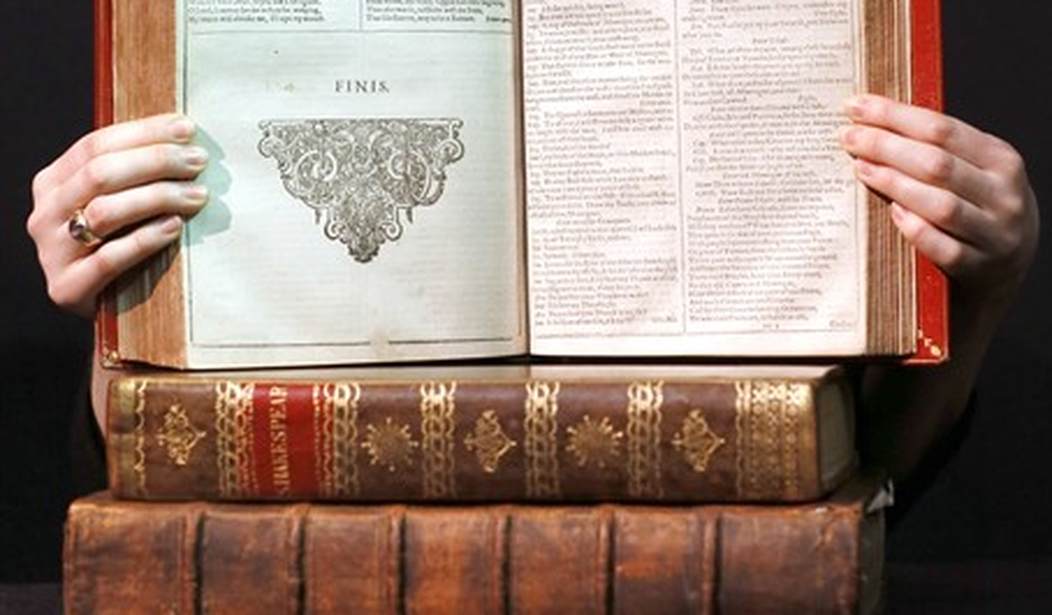For many, their primary exposure to Shakespeare came in a high school Lit class. I don't know about you, but for me, that consisted of reading "Romeo and Juliet" out loud. And to be fair, if that's all you ever encounter, you are likely going to toss the Bard on the ash heap of history and reach for the latest release of Halo. At that point, the only reason to keep a book of his collected works is to make your shelves look classy.
And who could blame you? Shakespeare makes for some painfully dry reading. To really get a proper feel for Shakespeare, you have to see the plays performed. A talented and devoted theatre production can certainly do Shakespeare justice, and there are more than a few outstanding film adaptations. Only then will you see the sword fights, the romance, and even the innuendo, as Shakespeare's original audience would have seen them.
For example, in the scene from "Romeo and Juliet," in which Tybalt kills Mercutio, there is seemingly tedious dialogue and the stage direction, "They fight." This is that scene from a film adaptation:
What the clip does not show is Mercutio's death:
ROMEO: Courage, man, the hurt cannot be much.
MERCUTIO: No, ’tis not so deep as a well, nor so wide as a church door, but ’tis enough. ’Twill serve. Ask for me tomorrow, and you shall find me a grave man. I am peppered, I warrant, for this world. A plague o’ both your houses! Zounds, a dog, a rat, a mouse, a cat, to scratch a man to death! A braggart, a rogue, a villain that fights by the book of arithmetic! Why the devil came you between us? I was hurt under your arm.
The man is bleeding to death in the street, and he is making jokes and puns. It is morbid while also darkly humorous. As it sometimes happens in life, comedy and tragedy collide. It is exactly the kind of thing that audiences at the Globe would have loved. The truth is that Shakespeare's plays are positively filled to the brim with murder, war, love, sex, comedy, joy, tragedy, and pathos. That, however, is too much for some people in, of all places, Britain. Many of his plays now come with trigger warnings because of the story elements mentioned above.
GB News reports that the Shakespeare's Globe in London has issued content warnings for "Julius Caesar," "Antony and Cleopatra," and "Romeo and Juliet." For "Antony and Cleopatra" audiences are warned about “depictions of suicide, scenes of violence and war and misogynoir references.” "Misogynoir" is the latest entry in the woke lexicon and refers to "discrimination against women and black people."
Wait until these people get a load of "Titus Andronicus." There won't be enough therapy puppies to go around.
‘For William Shakespeare, painting his status as Britain's most celebrated bard has been seemingly light work.'
— GB News (@GBNEWS) March 24, 2024
GB News West Midlands Reporter, @_jack_carson, explains controversy surrounding the works of William Shakespeare on Shakespeare week. pic.twitter.com/ucVCPmJzW5
The last gentleman in the video seems to miss the point. Times may have changed, but history has not changed. Literature has not changed.
GBN noted that last year, a production of "Macbeth," starring David Tennant, warned theatergoers that one of the triggers could be postnatal depression. I'm not sure how, but I guess if someone is pulling trigger warnings from their posterior, one threat is as good as another.
It also suggested that less-than-sturdy attendees brace themselves since “…this production explores psychosis and contains suggestions of post-combat and postnatal mental health concerns… On stage, there is blood, scenes of violence, and depictions of death.” Well, of course there are. It's "Macbeth." No one watches "Macbeth" for the climactic pie-throwing scene.
Ralph Fiennes had some thoughts about slapping warning labels on Shakespeare:
Via Modernity:
“When I was young we never had trigger warnings for shows”
— BBC Politics (@BBCPolitics) February 11, 2024
Actor Ralph Fiennes “the impact of theatre should be that you’re shocked” and that he thinks audiences have gone too soft#BBCLauraK https://t.co/jeHgbRQpp1 pic.twitter.com/D7ANngtKwP
Modernity also had a comment from Sir Ian McKellen:
Outside theatres and in the lobbies… the audience is warned ‘there is a loud noise and at one point, there are flashing lights, there is reference to smoking, there is reference to bereavement.'
I think it’s ludicrous, myself, yes, absolutely. I quite like to be surprised by loud noises and outrageous behaviour on stage.
As I said before, Shakespeare's plays are filled with murder, war, love, sex, comedy, joy, tragedy, and pathos. They are relevant today because the world is filled with murder, war, love, sex, comedy, joy, tragedy, and pathos. And if one cannot cope with those things on the stage or screen, one cannot cope with them in life. And since one cannot force life to conform to one's fears, the next best thing is to force others to conform to them.










Join the conversation as a VIP Member